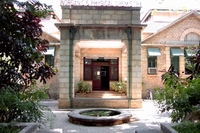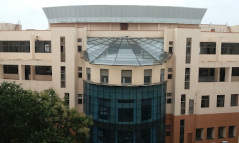Department Overview

Born more than a century ago in 1909 along with the Institute, named as "The Department of General and Applied Chemistry" at birth, this department has grown in many ways with the Institute, with its eyes focused on both fundamental and applied research in the broad areas of physical and inorganic chemistry. Currently, there are around 20 faculty members working in rich and diverse areas of chemistry including molecular spectroscopy, chemical dynamics, analytical and computational theory, electrochemistry, polymer chemistry, transition metal and non-metal chemistry, bioinorganic and biophysical chemistry, and functional materials. Other than pushing frontline research, the faculty of the department is equally committed to teaching. New courses are introduced by the departmental faculty frequently at the undergraduate as well as postgraduate levels. Regular student seminars, departmental seminars, colloquia and popular lectures make the department very lively, academic and the place to be in. During the middle of 2022, the department has moved to the new premises at the Chemical Sciences Building.
The department hosts some of the finest research instruments for carrying out work in advanced competitive areas of chemistry. Some of these instruments, such as the FT microwave spectrometer, surface-enhanced laser Raman spectrometer, Raman microscope, femtosecond pump-probe experimental set-ups, are home-built, whereas the high resolution TEM, the AFM, single crystal and powder X-ray and NMR spectrometers have been commercially acquired. Some of these sophisticated facilities were developed under various special programmes as well as from individual projects funded by Govt. and private funding agencies. The University Grants Commission had generously supported the department initially under the Special Assistance Programme in 1978 and then under the Center for Advanced Studies programme since 1980 till today. The Department of Science and Technology of the Ministry of Science and Technology has also supported the department under its FIST programme since 2000. Currently, the second phase of the FIST programme is running.

The Faculty members write projects directly to funding agencies and acquire facilities that are of direct importance to their own research. A large number of projects to individual members has been funded by Govt. agencies such as CSIR, DST, DRDO, DBT, BRNS, MIT, etc. and private agencies such as Boeing Corp., General Electric, Big Tec, 3M, etc. Technical know-how for the production of magnesium-manganese dioxide (Mg-MnO2) primary batteries and crystalline silicon based materials have been transferred to industry where it has found wide applications. Some of the projects taken up in the department are interdisciplinary in nature, involving faculty members from several departments and addressing problems that have wider implications and importance. Through such collaborative efforts faculty members are able to address harder and deeper problems which are generally difficult to handle by a single research group.
Mentoring students is one of our greatest strengths. We have a very vibrant and dedicated group of students pursuing research career in various fields. Currently, about 120 Ph.D. students, 20 research associates, 20 project assistants, and a large number of summer trainees constitute the main work force of the department. Selection of Ph.D. entrants to the department is made in two stages. All candidates have to qualify through NET or GATE to apply and be called for interview. After the interview, the selected students (typically about 20) are invited to join the department. In addition, the integrated Ph.D. programme of the Chemical Sciences Division, of which our department is a part, admits about 15 students after B.Sc. The selection of students for the Int. Ph.D. programme is done through JAM. The department has an excellent atmosphere for learning where many of the young minds grow up amidst intense discussions with the faculty members of the group or subgroup, regular seminars, group meetings, etc., and enable themselves to face any scientific challenge in the future. There are many international students in the department which enriches the social and cultural lives and experiences of the students.
Additional information about the department including procedure for admission, information about fellowships and facilities available in the department, research profile of each faculty may be found on the Home Page.
